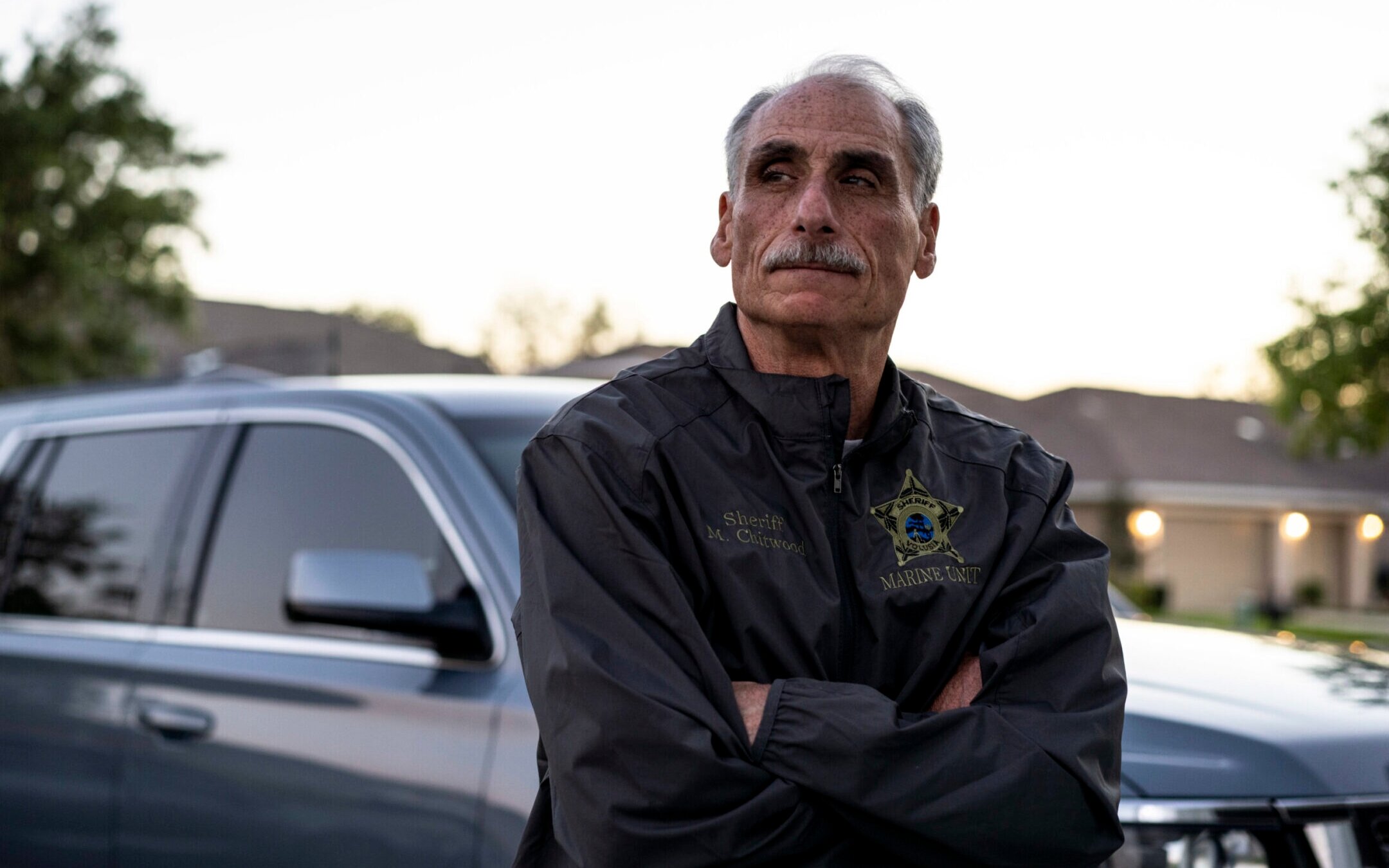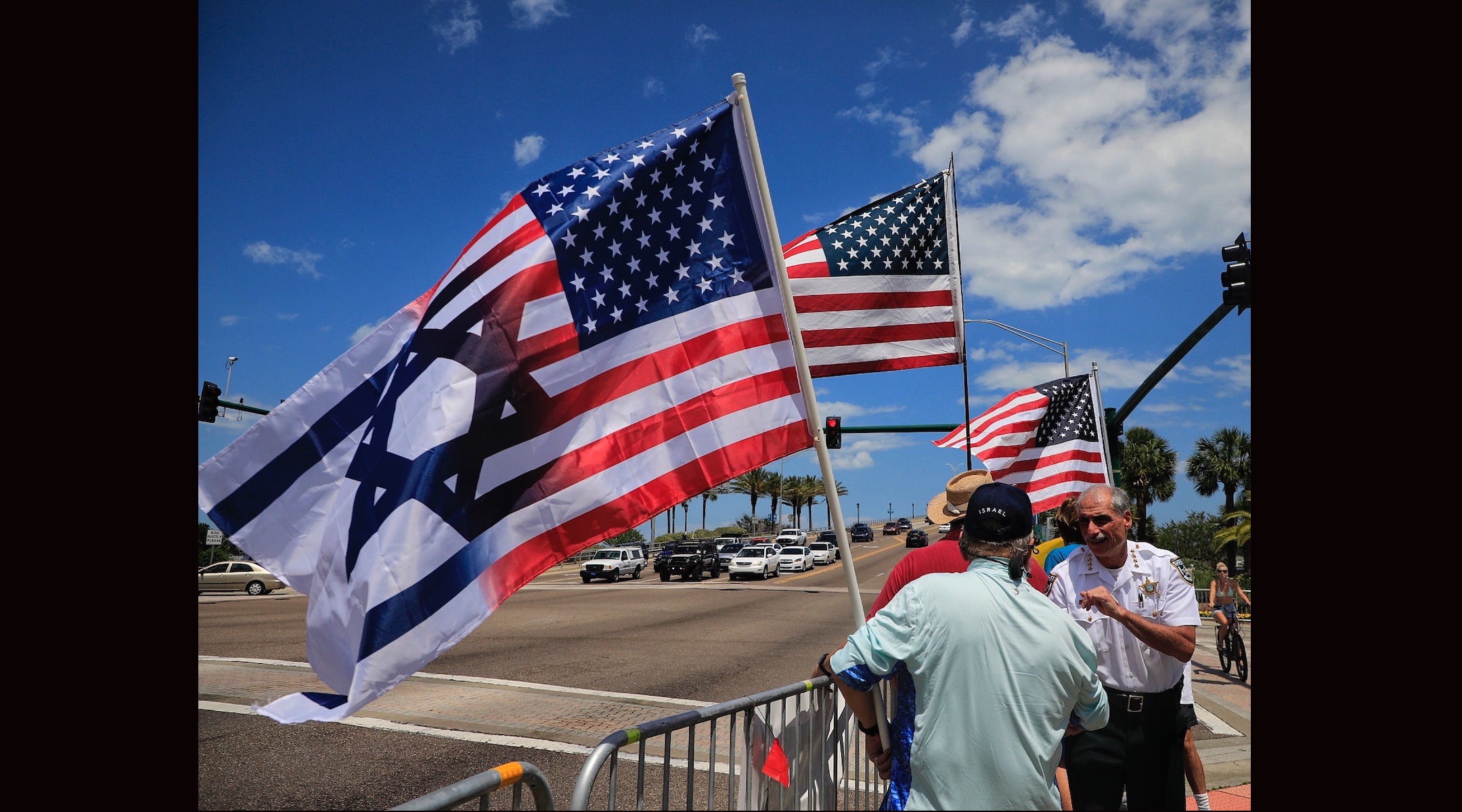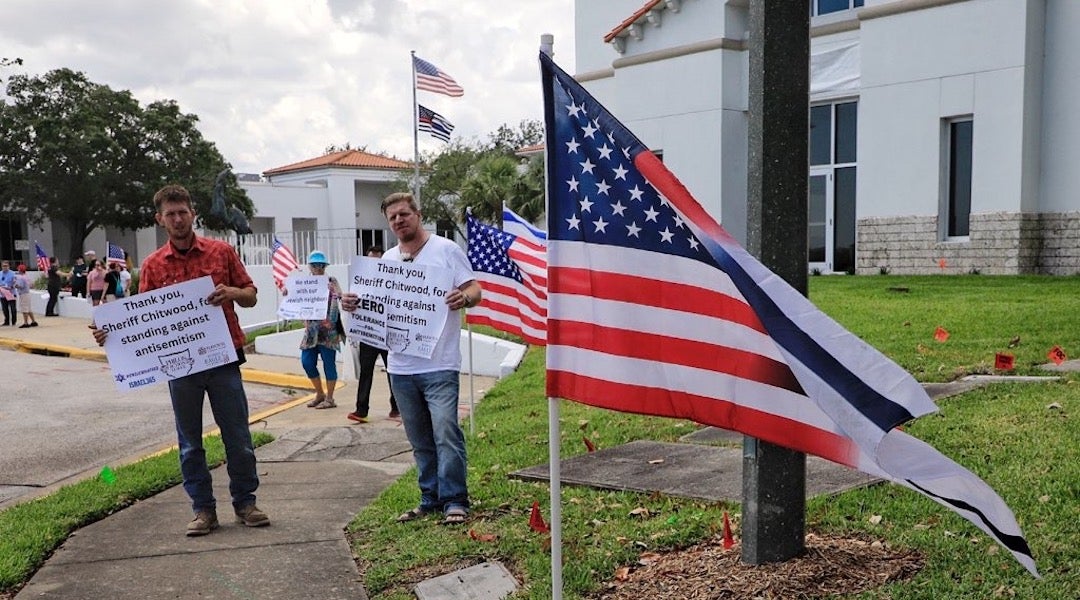A Florida sheriff is on the warpath against neo-Nazi ‘scumbags’ who want him dead
Michael Chitwood has taken on the Goyim Defense League, and has the arrests to show for it

Volusia County Sheriff Mike Chitwood outside his home in Port Orange, Florida, March 16 2023. (Thomas Simonetti for The Washington Post via Getty Images)
(JTA) – After hate groups in his county on Florida’s East coast projected antisemitic messages onto the Daytona International Speedway, the local sheriff delivered a press conference with one simple message: He’d had enough.
“We put up their photos, talked about their arrest records, and let everybody know what a bunch of reprehensible thugs were in our community, and what they were up to,” Sheriff Mike Chitwood told the Jewish Telegraphic Agency about the February press conference. Standing with local Jewish, interfaith and minority group representatives, the sheriff had announced he would be coming after the “scumbags” who did this.
“And after that,” he recalled, “all hell broke loose.”
The group that had made its presence known in Volusia County was the Goyim Defense League, one of the country’s most prominent antisemitic organizations, known for harassing worshippers at synagogues and papering neighborhoods with fliers hawking anti-Jewish conspiracies.
The movement’s leaders recently relocated to the area from California, and they had chosen the Daytona 500, a major NASCAR race that draws more than 100,000 people to the speedway, to make their antisemitic presence known. They didn’t like that the sheriff was now effectively declaring war on them.
Online after the press conference, several men started making death threats against Chitwood, even harassing his daughter and sending SWAT teams to his parents’ house. Antisemitic groups began planning to hold a public demonstration to oppose him specifically, which Chitwood’s intelligence determined was set for this past weekend in Ormond Beach.
So Chitwood fought back. Last week, thanks in part to his corralling, three men in three different states — California, Connecticut and New Jersey — were arrested and charged with making online death threats against him. Two of the three have already been extradited to Volusia County.

On Saturday the sheriff went to the airport to personally “welcome” one of the men. He hopes to send a message to hate groups more generally that he intends to “keep up the heat” so that they know they will face resistance from law enforcement if they attempt any public demonstrations: “I think that makes it a little bit harder to peddle your wares.”
Amid a national climate of rising antisemitism, one vexing question has been how to tackle antisemitic activity that is trollish but not violent. While European authorities have prosecuted Holocaust denial and other antisemitic sentiments expressed in social media posts, U.S. law is less expansive about what kind of online posts represent criminal activity. Meanwhile, the Goyim Defense League’s most frequent activities — flier drops, banner displays and public demonstrations — make up the fastest-growing type of antisemitic incidents in the United States, according to the Anti-Defamation League, but they do not always violate the law. A citation for littering in Wisconsin last year was the first known charge in the United States related to the Goyim Defense League’s distribution of antisemitic materials.
The issue is especially acute in Florida, where the populations of Jews and avowed antisemites are both growing. Chitwood suspects the state’s rising Jewish population is one of the reasons why white supremacists have also flocked to the area, along with Florida’s relaxed gun laws.
In this environment, Chitwood’s outspokenness and forceful commitment to eradicating antisemitism — in a county with a relatively small number of Jews — has set a new tone. Raised in a law-enforcement family in Philadelphia — his father was a prominent police officer whose biography chronicles his own battle against “scumbags” — Chitwood speaks in a tough clip peppered with colorful insults directed at his white supremacist opponents (“these clowns,” “little sissies,” “ugly faces”). His passion on the issue is evident when he talks about his desire to be “standing in for John Q. Citizen,” or “some poor son-of-a-gun that’s going to synagogue.” He’s still green enough on the issue that he frequently confuses the Anti-Defamation League with the “JDL,” or Jewish Defense League — a radical violent splinter group of Jewish extremists.
Chitwood has garnered national attention for his actions, as well as the respect of the Jewish community.
“This sheriff is not like all the others, in a sense,” said Oren Segal, vice president of the ADL’s Center on Extremism. “He’s taking different methods and putting himself out there and showing what one type of response can be.”
Rob Lennick, director of the Jewish Federation of Volusia and Flagler Counties, is one of Chitwood’s local allies. The federation is known locally for running several charitable programs, including food pantries, meant to reach people in need across the entire community, and Chitwood has a good relationship with them.
Lennick praised Chitwood for taking “a very strong forward position against these neo-Nazis, against these white supremacist groups coming to our community.” (Lennick arrived in Volusia County last year after leaving the Jewish Federation of New Mexico, which collapsed after employees accused him of misconduct.)

In the end, the planned neo-Nazi demonstration against Chitwood on Saturday never took place — though a large group of what the sheriff described as “professional counter-protesters” did show up, flying joint American and Israeli flags and thanking him for standing up to antisemitism. Walking among that interfaith crowd, many of whom had traveled from outside the county to be there, was profound for Chitwood. The experience “was very, very humbling,” he said. “I don’t think I’ve wrapped my brain around it yet.”
Segal declined to comment on the degree to which Chitwood’s office has liaised with the ADL. But he praised Chitwood’s outspokenness, and said he considered it a form of “allyship.”
“It’s easy to speak out against something that breaks the law. It’s not always easy to speak out against something that breaks the value of our communities because it’s hateful, because it scares people, because it makes people feel unsafe,” Segal said. He mused that the fact that so many neo-Nazis now have Chitwood in their crosshairs “creates an inadvertent bond between law enforcement and the Jewish community, that they’re both being harassed by antisemites.”
Lennick had advised local Jews not to attend the site of the protests, not even to participate in the counter-protests. “You’re walking a fine line,” he said. “You don’t want to fuel the bad guys.”
Chitwood, though, has made a point out of naming and shaming the antisemites in his midst, believing that the increased media attention will expose further misdeeds and make it harder for them to hold down employment.
“There is now a national spotlight on these GDL punks,” Chitwood said. “Sooner or later, they’re going to stub their toe. And you have all these entities looking at you.”
The sheriff wants to go further in his crusade. He has pushed for a bill in the Florida legislature that would allow him and other law enforcement in the state to charge people with felonies for distributing fliers and broadcasting messages of “ethnic intimidation” on private property.

On Thursday, Florida’s Republican governor, Ron DeSantis, signed the bill into law during a ceremony in Jerusalem after Randy Fine, the Jewish Republican state representative who authored it, delivered it to him there. (DeSantis last year called Nazis rallying in his state “jackasses” but drew criticism for not condemning them more forcefully.) The law was written specifically to address the kinds of activities the Goyim Defense League regularly engages in, including the Daytona message that spurred Chitwood to address the problem head-on, and enjoyed unanimous support from legislators of both parties.
“I guess we need to thank our scumbag Neo-Nazi invaders for uniting our community and the entire state of Florida against hate,” Chitwood tweeted after the signing.
“I see it as another tool in the toolbox,” Chitwood told JTA about his support of the bill. “You go onto private property and drop these leaflets on somebody’s doorstep or in their driveway, that’s now a felony trespass.”
Chitwood acknowledges that law enforcement can often be slow to respond to crimes of ethnic intimidation, and particularly online harassment, which hinders their ability to organize against a common threat. “We are very reactive,” he said. “No matter what it is, even a car break trend, sometimes you have to break into 20 or 30 cars before we detect a trend to go and do what needs to be done.”
He’s frank about the police’s shortcomings when it comes to dealing with such behavior. The fact that he is a sheriff, he said, meant that it was easier to bring the perpetrators of out-of-state online death threats to justice. And, he said, broad coordination across different law enforcement entities for the specific addressing of antisemitism in the state does not yet exist: Apart from communication with some neighboring county sheriffs and the FBI, efforts to collaborate with the broader law enforcement community have been slow.
But, he said, he remains committed to trying to fight antisemitism in his own backyard at the very least. “It is personal,” Chitwood said. “This is my community.”
This article originally appeared on JTA.org.














